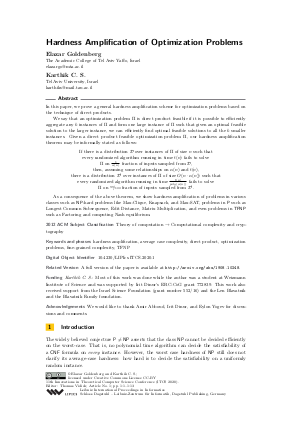@InProceedings{goldenberg_et_al:LIPIcs.ITCS.2020.1,
author = {Goldenberg, Elazar and Karthik C. S.},
title = {{Hardness Amplification of Optimization Problems}},
booktitle = {11th Innovations in Theoretical Computer Science Conference (ITCS 2020)},
pages = {1:1--1:13},
series = {Leibniz International Proceedings in Informatics (LIPIcs)},
ISBN = {978-3-95977-134-4},
ISSN = {1868-8969},
year = {2020},
volume = {151},
editor = {Vidick, Thomas},
publisher = {Schloss Dagstuhl -- Leibniz-Zentrum f{\"u}r Informatik},
address = {Dagstuhl, Germany},
URL = {https://drops.dagstuhl.de/entities/document/10.4230/LIPIcs.ITCS.2020.1},
URN = {urn:nbn:de:0030-drops-116863},
doi = {10.4230/LIPIcs.ITCS.2020.1},
annote = {Keywords: hardness amplification, average case complexity, direct product, optimization problems, fine-grained complexity, TFNP}
}

 Creative Commons Attribution 3.0 Unported license
Creative Commons Attribution 3.0 Unported license

